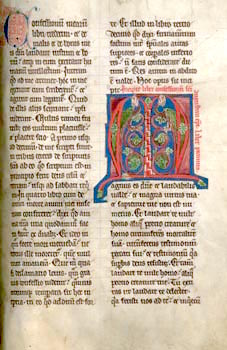Homily of Fr. Paul Panaretos, S.J.
A Ninth Beatitude
Mary Elizabeth and Dean I thank you and congratulate you for taking this step to join God, who blesses you and “strengthen[s your] love for each other.” That was the sentiment of the opening prayer you chose for your wedding. God’s strengthening and empowering is very different from what we expect. I want to reflect briefly with you and your guests about that because God’s strengthening empowerment is the core of Christian marriage and all Christian relationships.
It may be helpful first to say what God’s power is not. A phrase me help: power-play. That phrase suggests striving; grabbing and even trampling on others for selfish gain. The gain, of course, is to position oneself ahead of others or even beyond others. That is not what God empowers us to do.
Christian strength does not seek to get ahead of or beyond others. Christian strength seeks to build up others, to edify them and to bless what is weak and even, as St. Paul challenged, to bear with others to the point of forgiving them. Paul echoed clearly what Jesus modeled for us: compassion.
 Compassion has nothing to do with power-plays between Christian peers. Compassion deepens your relationship with each other and each one’s relationship with God. No wonder from the church’s beginning that Christian marriage has pointed to the relationship of Christ and his church!
Compassion has nothing to do with power-plays between Christian peers. Compassion deepens your relationship with each other and each one’s relationship with God. No wonder from the church’s beginning that Christian marriage has pointed to the relationship of Christ and his church!Humans don’t win God’s compassion. God is compassionate toward us and, sometimes to our chagrin, to those who have little or no footing to win anything. Jesus cataloged God’s preeminent desires in the Beatitudes, those blessings for the poor in spirit, the gentle, those in need of comfort, those who long for the peace of God’s kingdom, the merciful, the single-hearted, the peacemakers and whoever is reviled for acting in the cause of God’s justice. To imitate God in these ways--whether in our homes or outside them; with people we know and with strangers--to imitate God in these ways is one way we fulfill our baptismal commitment and charge to give prophetic witness, that is, to point to Jesus by how we live.
Regular prayer with each other, Dean and Mary Elizabeth, is crucial to fulfilling that. Your married life is a witness, a prophetic witness. A life of prophetic witness is a vocation, which means your married love and life is a vocation from God as distinct as my own vocation.
As I think of my own vocation, the mutual support from and for my Jesuit brothers and our self-sacrificial love for one another come first to mind. Your mutual concern and self-sacrificial love for each other are hallmarks of your married vocation, Mary Elizabeth and Dean.
This is the context of the Book of Tobit, that edifying tale containing the prayer of the new spouses, which you chose for yourselves and for us to hear. All the good fortune and all skills are no substitute for praying for the deeper desire to cooperate with God’s grace.
Dean and Mary Elizabeth, remember that God has given you to each other in order that you may lead one another, care for each other and help others--including strangers and not only us--to meet God. Some people may meet God for the first time because of your love for each other.
While Scripture contains eight Beatitudes, you are together one more Beatitude blessing our world with Christian power and example. Enjoy your wedded life, Mary Elizabeth and Dean! God bless your vocation to deepen your love for one another and to inspire many others to draw on God’s strength more and more.
________________________________________________________
Giovanni Dall'Orto's photo of the Marriage at Cana fresco on the ceiling of the Chora in Istanbul is used under the Creative Commons Attribution ShareAlike2.5 License.













